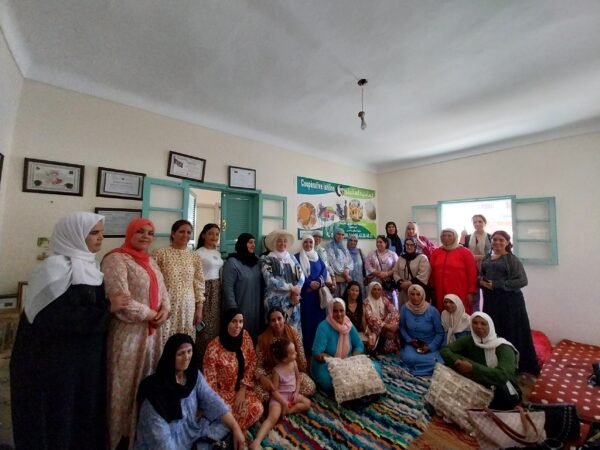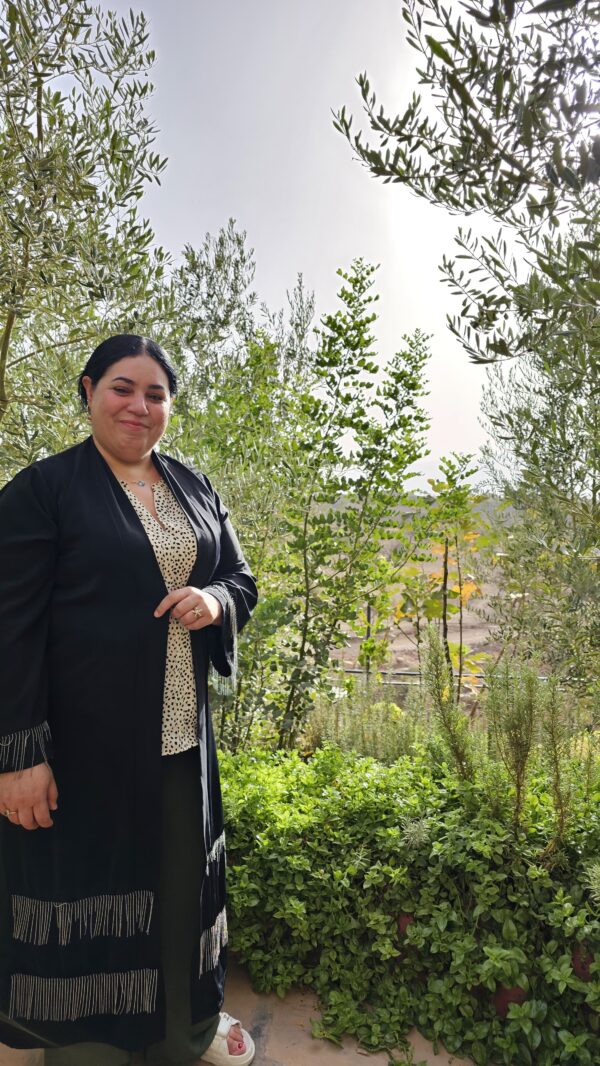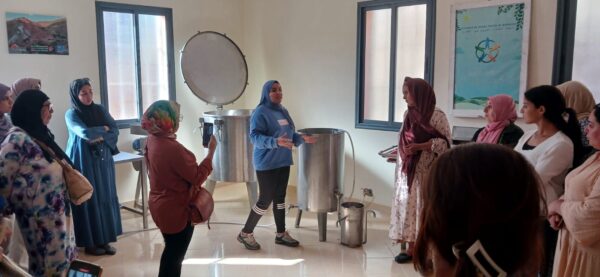On August 26–28, 2024, the Resilient Women in the Middle Atlas (FERMA) project organized a series of highly rewarding exchanges among several women’s cooperatives in the Middle Atlas region. This event, led by SOCODEVI in partnership with Morocco’s national water and forestry agency (ANEF) and with financial backing from the Government of Canada, is one of our many efforts to empower women financially and help them sustainably manage natural resources.
During these first-ever exchanges, 24 women members of the 12 FERMA-supported co‑ops in the Khénifra National Park (PNKh) region learned about innovative, sustainable ways to manage natural resources and non-timber forest products (NTFPs). Participants visited local women’s co‑ops specializing in biochar and saffron production, as well as other NTFP commercial activities, such as the sale of medicinal and aromatic plants.
The FERMA project: Women’s empowerment and sustainable management
Through the FERMA project, SOCODEVI aims to boost the resilience of climate-vulnerable women’s co‑ops. Khénifra National Park, known as the “water tower of Morocco,” is located in the heart of the Middle Atlas and is seeing the impacts of climate change, including a significant drop in precipitation and water regime levels, which increases ecosystem vulnerability and threatens water resources that are essential to the entire country. To respond to these challenges, the project is providing personalized support to help women, including young women, take a major role in sustainably managing natural resources and preserving the ecosystem in the PNKh. The program also stimulates local economic development by supporting the creation and development of profitable, environmentally friendly co‑ops.

Building innovative solutions to transform women’s co‑ops
Our Morocco project takes a unique, innovative approach, combining ecosystem conservation with the economic empowerment of women’s co‑ops. During the exchanges in the Béni Mellal-Khénifra region, participants learned about successful economic models that apply nature-based solutions (NBS), which local co‑ops are already using to protect cedar groves in the Middle Atlas and sustainably create value from NTFPs, including medicinal and aromatic plants.
These co‑ops are located in rural areas that are geographically similar to Khénifra National Park and are proof that environmental protection and economic development can indeed go hand in hand. The exchange’s participants, who manage or have founded co‑ops in the equally vulnerable PNKh zone, were able to relate to what they saw and grasped how important it is to organize co‑ops and use sustainable techniques to ensure that they can continue operating profitable enterprises for years to come.

An inspiring learning experience
The FERMA project participants who visited these successful co‑ops were able to observe practices that they can apply in their own co‑ops. Eco‑friendly NTFP harvesting techniques and inclusive governance strategies are two concrete examples of how women can take part in local decisions about how to manage natural resources. Although these initiatives have yet to take full root in the co‑ops supported by SOCODEVI’s FERMA project, they are paving the way for a sustainable transformation and the creation of new economic opportunities for women in the PNKh region.
A promising view of the future
Participants not only learned a great deal on the exchange, but left the visit feeling motivated and hopeful for the future of their co‑ops. The women felt inspired to overcome the challenges they face and, with the project’s ongoing support, make their dreams a reality.
Miftahi Hayat, from the Aadjib co‑op, was highly affected by the experience:

“Thank you so much to ANEF and the FERMA project for organizing this exchange. I’d also like to thank the co‑ops that allowed us to learn from their experiences and see their work up close. This visit inspired and encouraged us, as we were able to see that despite the trials and tribulations they’ve faced, they’ve still managed to achieve their goals. We learned that above all else, we need to believe in ourselves and work hard if we want our projects to succeed.”
Sustainable support for a promising future
This initiative is a way for the FERMA project to help women’s co-ops in the Béni Mellal-Khénifra region share innovative solutions, as well as network and build stronger ties for collaboration. The project works closely with women to help them gain technical and organizational skills so they can better manage their co‑ops and maximize their environmental and economic impact.
This personalized support will also give FERMA-supported co‑ops the resources they need to embrace environmentally friendly practices without hurting their bottom line. The initiatives will grow over time, bolstering resilience to climate change-related challenges and fostering sustainable forest ecosystem management.

The FERMA project: A commitment to lasting support
This first-ever exchange marked an important milestone in SOCODEVI’s support of women’s co‑ops, as it gave participants the chance to network with model examples of successful co‑ops. Experienced co‑ops can now provide PNKh co‑ops with mentorship and ongoing support to help them embrace sustainable management practices and improve their bottom line.
The project, which will run from March 2023 to March 2028, is still in its early stages, but it has laid the foundations for a future where women’s co‑ops will play a central role in the sustainable management of natural resources in the Middle Atlas.
The FERMA project is the very definition of an inclusive community approach, where particular care is taken at each step to include women and strengthen their environmental governance leadership. This exchange is the first step toward sustainable transformation and promises a future where women, including young women, have everything they need to rise to the climate and economic challenges they face.
Text:
Zineb Bouasria, Communication Specialist (SOCODEVI-Morocco)
Photos:
FERMA project team (SOCODEVI-Morocco)